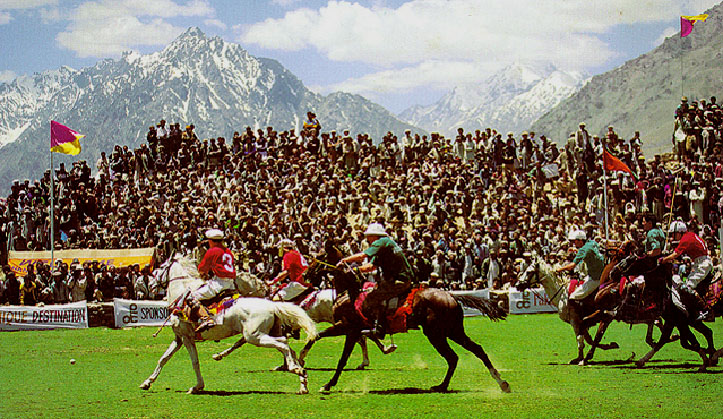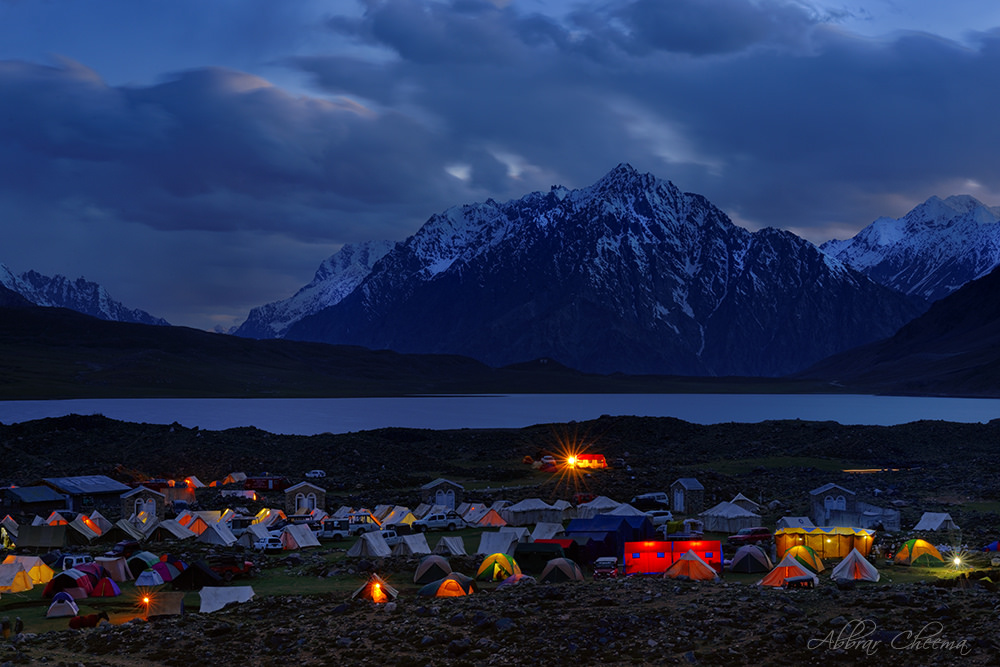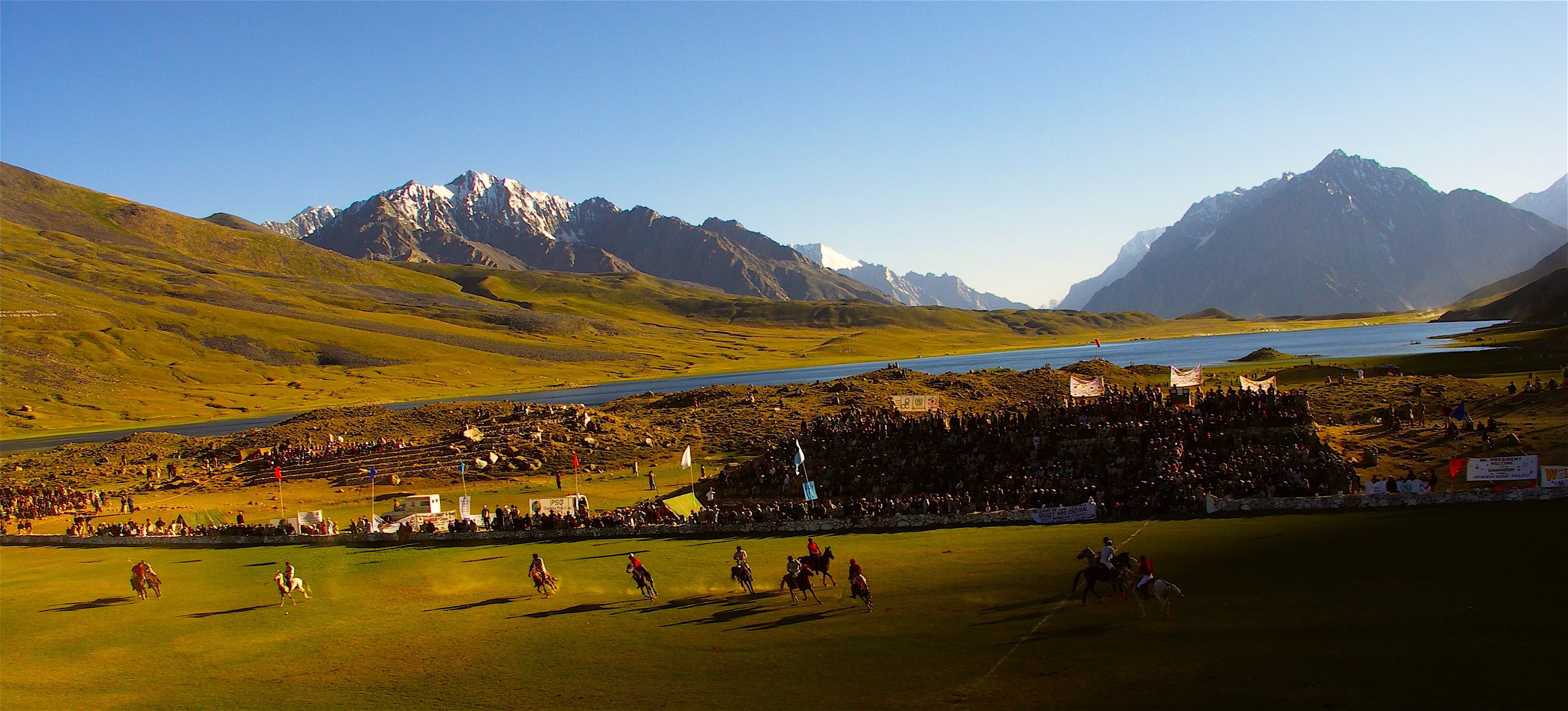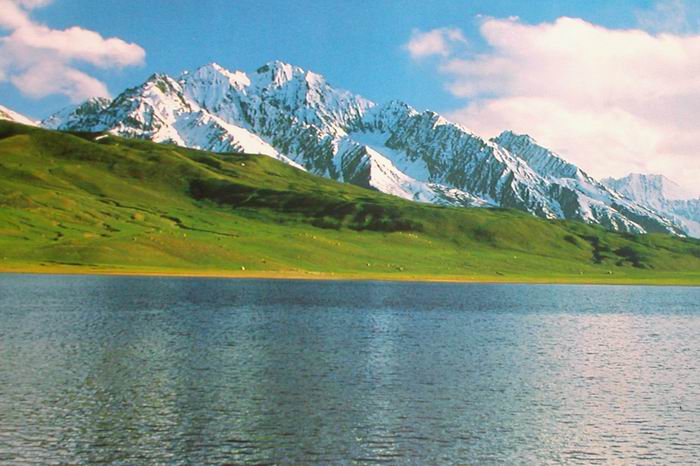
Shandur Polo Festival:Passion for Polo will be the highest on the world’s highest Polo ground. Every year, Shandur (3,734 meters) invites visitors to experience a traditional polo tournament between the teams of Chitral and Gilgit from 7th to 9th July. The festival also includes folk music, folk dance, traditional sports and a camping village is be set up on the Pass.
Polo is an equestrian sport with its origin embedded in Central Asia dating back to 6th century BC. At first it was a training game for cavalry units for the King’s guards or other elite troops. To the warlike tribesmen who played polo with as many as 100 players to a side, it was a miniature battle. It became a Persian national game in the 6th century AD. From Persia, the game spread to Arabia, then to Tibet, China and Japan. In China, in the year 910, death of a favourite relative in a game prompted Emperor Apao-Chi to order beheading of all players!
Polo was introduced in South Asia, by the Muslim conquerors in the 13th century. English word ‘Polo” is in fact a Balti word meaning, “ball”. In ancient times, there was no limit to the number of players and no time limit. Whichever team scored nine goals first, became the winner. Today, there are six players to each side, but this is by no means a rule in local polo games. The game lasts for one hour with a ten-minute break.
Gilgit, Chitral and Skardu have always played the game of polo closest to its original form. In the past, local Rajas, Mirs and Mehtars were the patrons of the game. At times, more than 50% of the annual budget of their principalities was spent on supporting the game.
Highlights Of The Festival
Passion for Polo will be the highest on the world’s highest Polo ground. Shandur invites visitors to experience a traditional polo tournament between the teams of Chitral and during the 2nd week of July. The tournament is held on Shandur Pass, the highest polo ground in the world at 3,700 meters. The festival will also include folk music and dancing and a camping village is set up.
Background
Polo is an equestrian sport with its origin embedded in Central Asia dating back to 6th century BC. At first it was a training game for cavalry units for the King’s guards or other elite troops. To the war like tribesmen who played polo with as many as 100 players to a side, it was a miniature battle. It became a Persian national game in the 6th century AD. From Persia, the game spread to Arabia, then to Tibet, China and Japan. In China, in the year 910, death of a favorite relative in a game prompted Emperor Apao-Chi to order beheading of all players!
Polo was introduced in South Asia, by the Muslim conquerors in the 13th century. English word ‘Polo” is a Balti word meaning, ‘ball’. Now a days, there are six players to a side, but this is by no means a rule in local polo games. There was no limit to the number of players and no time limit. Whichever team scored nine goals first, was the winner. The present game with a team of six players in a side, lasts one hour with a ten minute break.
Gilgit, Chitral and Skardu have always played the game of polo closest to its original form. In the past, local Rajas, Mirs and Mehtars were the patrons of the game. At times, more than 50% of the annual budget of their principalities would be spent on supporting the game.
Shandur Polo Tournament:
The first time a polo tournament took place at the Shandur Pass, was in 1936. A British Political Agent, Major Cobb, who was fond of playing polo under a full moon, had the polo ground near Shandur, named. ‘Moony Polo Ground’.
The most exciting polo tournament of the entire Northern Pakistan, is played on top of Shandur Pass, around 3,700 meters above sea level. It is a place unique and exotic in itself, surrounded by some of the most spectacular mountain scenery in the world. The event marks the annual rivalry between the polo teams of Gilgit and Chitral. The Polo tournament has some added attractions for the visitors; trout fishing at the nearby streams and lakes and a festival of folk dances and music of the Northern Pakistan.
The highlight of the festival is the final match between the Gilgit and Chitral teams. The final provides a most colorful spectacle. Supporters of both sides travel long distances from the remote parts of Chitral and Gilgit, to watch the thrilling game. The event, as such, offers a fascinating insight into the lifestyle of the people of this region. Their culture and indigenous customs are a delight to behold for the visitors.
Festival Information
It is advisable to be there one day in advance to enjoy all the offerings of the festival. Activities at Shandur includes dance and music performances by different groups, trout fishing, mountaineering, trekking, hiking and of course, horse riding. Crystal clear lakes, snow covered mountains, alpine flowers and vast stretches of green grass, are added attractions.
Facilities
A tourist tent village with restaurant facilities is sprung up during the tournament. Merchants from Peshawar, Chitral and Gilgit set up souvenir and folk craft shops. The tournament offers visitors and opportunity to mix with the locals.
How to reach?
The Shandur Pass lies almost midway between Chitral and Gilgit on a jeep road, travelling on which, is adventurous, to say the least. The distance from either side is 170 kms. One can get to Chitral or Gilgit by Pakistan International’s daily F27 Fokker planes form Peshawar and Islamabad. There are daily two flights from both destinations, subject to good weather. Visitors planning to go by air must expect adjustment of minimum 02 days in their itineraries just in case the weather does not permit flights to operate.
Access to Chitral by road is either from Peshawar or from Islamabad. Both these routes join up in lower Swat valley near Chakdara, from where you proceed via Dir over 3200 meters high Lowari Pass and on to Chitral. It will take about 11 hours for a direct ride, otherwise, a stopover in Dir is recommended. From Dir, you shift to 4×4 jeeps for your onward journey to Chitral and on to Shandur. From Chitral side, travelers can also enjoy overnight stay at Mastuj whereas from Gilgit side, Gupis is a suitable place.
Travelling by road from Islamabad, on the Karakoram Highway (the Silk Route), visitors can stop at halfway for overnight stay along the mighty Indus, at Besham.
Accommodation
For visitors to Shandur, Pakistan Tourism Development Corporation (PTDC) has set up its new motels with all facilities like, attached toilet/bathroom, hot/cold water, restaurant etc, at Panah Kot (Dir), Chitral, Bamburet (Kalash Valley), Besham (KKH), Barseen (KKH) and Gilgit, besides some private hotels. On the Pass, a tent village with all facilities is set up.



